Ethics and Governance: Tax Avoidance and its Impact on Governments and Society
VerifiedAdded on 2023/06/15
|10
|2711
|353
AI Summary
This article discusses the impact of tax avoidance on governments and society. It explores the ethical issues surrounding tax planning and tax avoidance, and the use of tax havens and secrecy jurisdictions. The article also examines the General Anti-avoidance Rule (GAAR) and the principles of ethics that should guide tax policies.
Contribute Materials
Your contribution can guide someone’s learning journey. Share your
documents today.
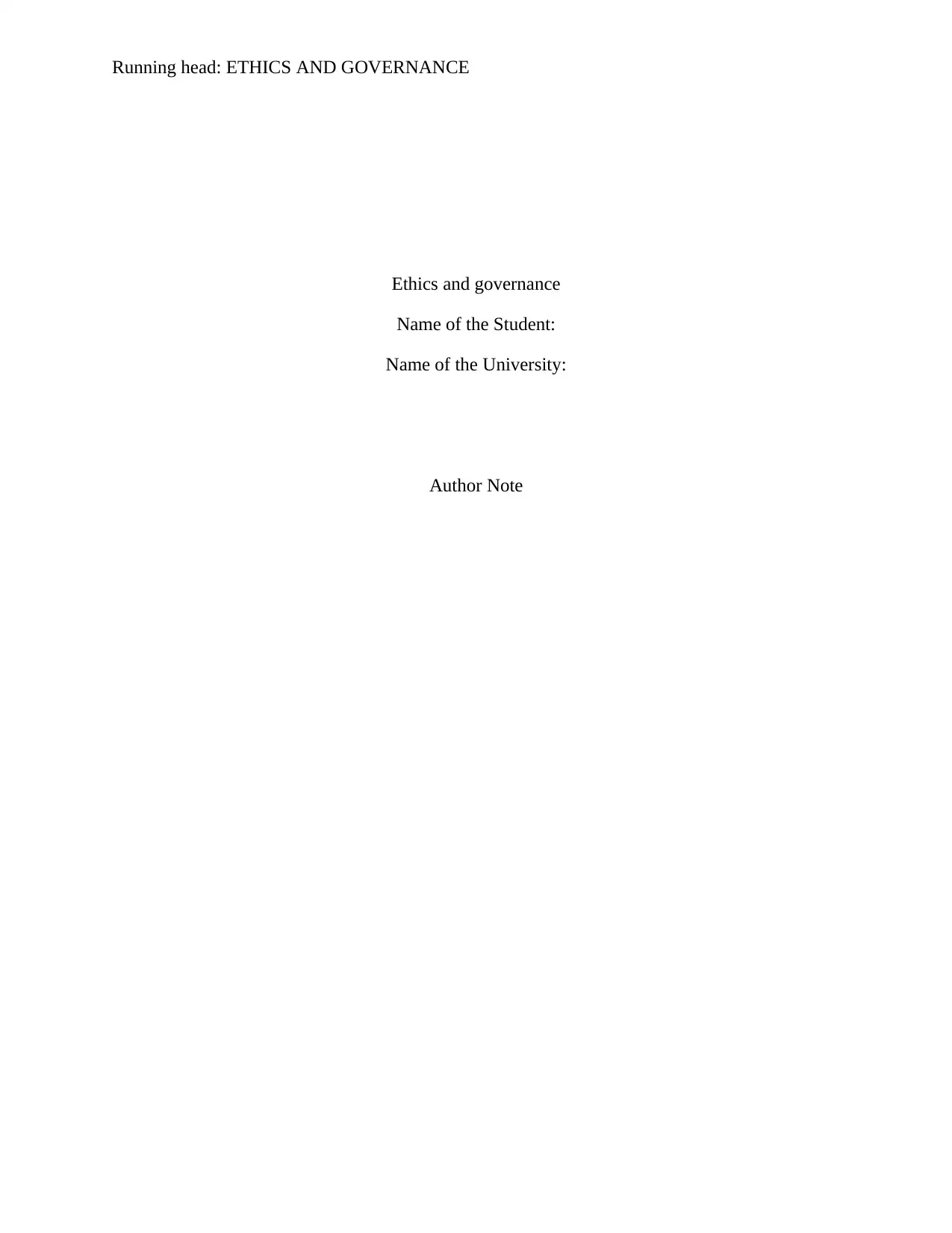
Running head: ETHICS AND GOVERNANCE
Ethics and governance
Name of the Student:
Name of the University:
Author Note
Ethics and governance
Name of the Student:
Name of the University:
Author Note
Secure Best Marks with AI Grader
Need help grading? Try our AI Grader for instant feedback on your assignments.
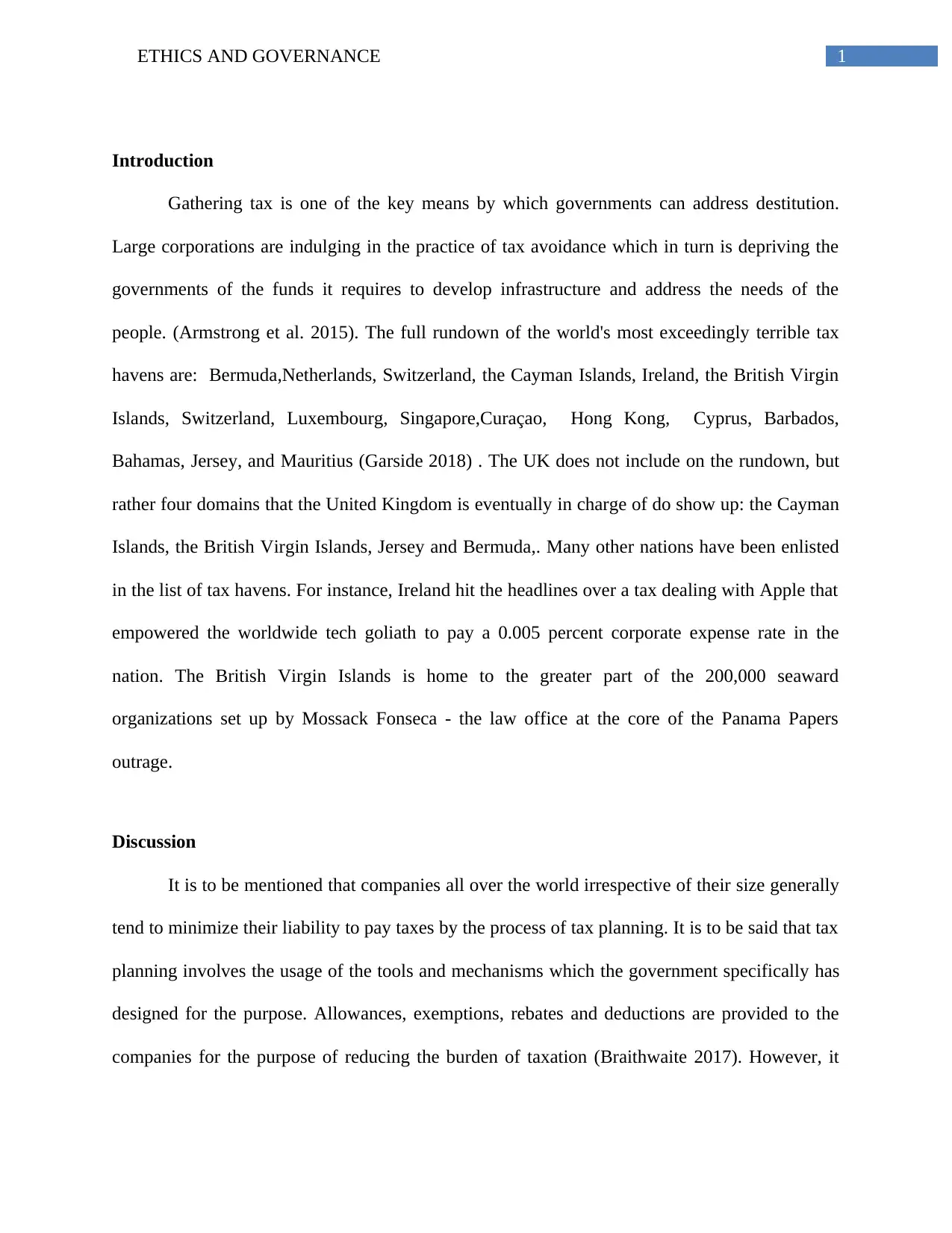
1ETHICS AND GOVERNANCE
Introduction
Gathering tax is one of the key means by which governments can address destitution.
Large corporations are indulging in the practice of tax avoidance which in turn is depriving the
governments of the funds it requires to develop infrastructure and address the needs of the
people. (Armstrong et al. 2015). The full rundown of the world's most exceedingly terrible tax
havens are: Bermuda,Netherlands, Switzerland, the Cayman Islands, Ireland, the British Virgin
Islands, Switzerland, Luxembourg, Singapore,Curaçao, Hong Kong, Cyprus, Barbados,
Bahamas, Jersey, and Mauritius (Garside 2018) . The UK does not include on the rundown, but
rather four domains that the United Kingdom is eventually in charge of do show up: the Cayman
Islands, the British Virgin Islands, Jersey and Bermuda,. Many other nations have been enlisted
in the list of tax havens. For instance, Ireland hit the headlines over a tax dealing with Apple that
empowered the worldwide tech goliath to pay a 0.005 percent corporate expense rate in the
nation. The British Virgin Islands is home to the greater part of the 200,000 seaward
organizations set up by Mossack Fonseca - the law office at the core of the Panama Papers
outrage.
Discussion
It is to be mentioned that companies all over the world irrespective of their size generally
tend to minimize their liability to pay taxes by the process of tax planning. It is to be said that tax
planning involves the usage of the tools and mechanisms which the government specifically has
designed for the purpose. Allowances, exemptions, rebates and deductions are provided to the
companies for the purpose of reducing the burden of taxation (Braithwaite 2017). However, it
Introduction
Gathering tax is one of the key means by which governments can address destitution.
Large corporations are indulging in the practice of tax avoidance which in turn is depriving the
governments of the funds it requires to develop infrastructure and address the needs of the
people. (Armstrong et al. 2015). The full rundown of the world's most exceedingly terrible tax
havens are: Bermuda,Netherlands, Switzerland, the Cayman Islands, Ireland, the British Virgin
Islands, Switzerland, Luxembourg, Singapore,Curaçao, Hong Kong, Cyprus, Barbados,
Bahamas, Jersey, and Mauritius (Garside 2018) . The UK does not include on the rundown, but
rather four domains that the United Kingdom is eventually in charge of do show up: the Cayman
Islands, the British Virgin Islands, Jersey and Bermuda,. Many other nations have been enlisted
in the list of tax havens. For instance, Ireland hit the headlines over a tax dealing with Apple that
empowered the worldwide tech goliath to pay a 0.005 percent corporate expense rate in the
nation. The British Virgin Islands is home to the greater part of the 200,000 seaward
organizations set up by Mossack Fonseca - the law office at the core of the Panama Papers
outrage.
Discussion
It is to be mentioned that companies all over the world irrespective of their size generally
tend to minimize their liability to pay taxes by the process of tax planning. It is to be said that tax
planning involves the usage of the tools and mechanisms which the government specifically has
designed for the purpose. Allowances, exemptions, rebates and deductions are provided to the
companies for the purpose of reducing the burden of taxation (Braithwaite 2017). However, it
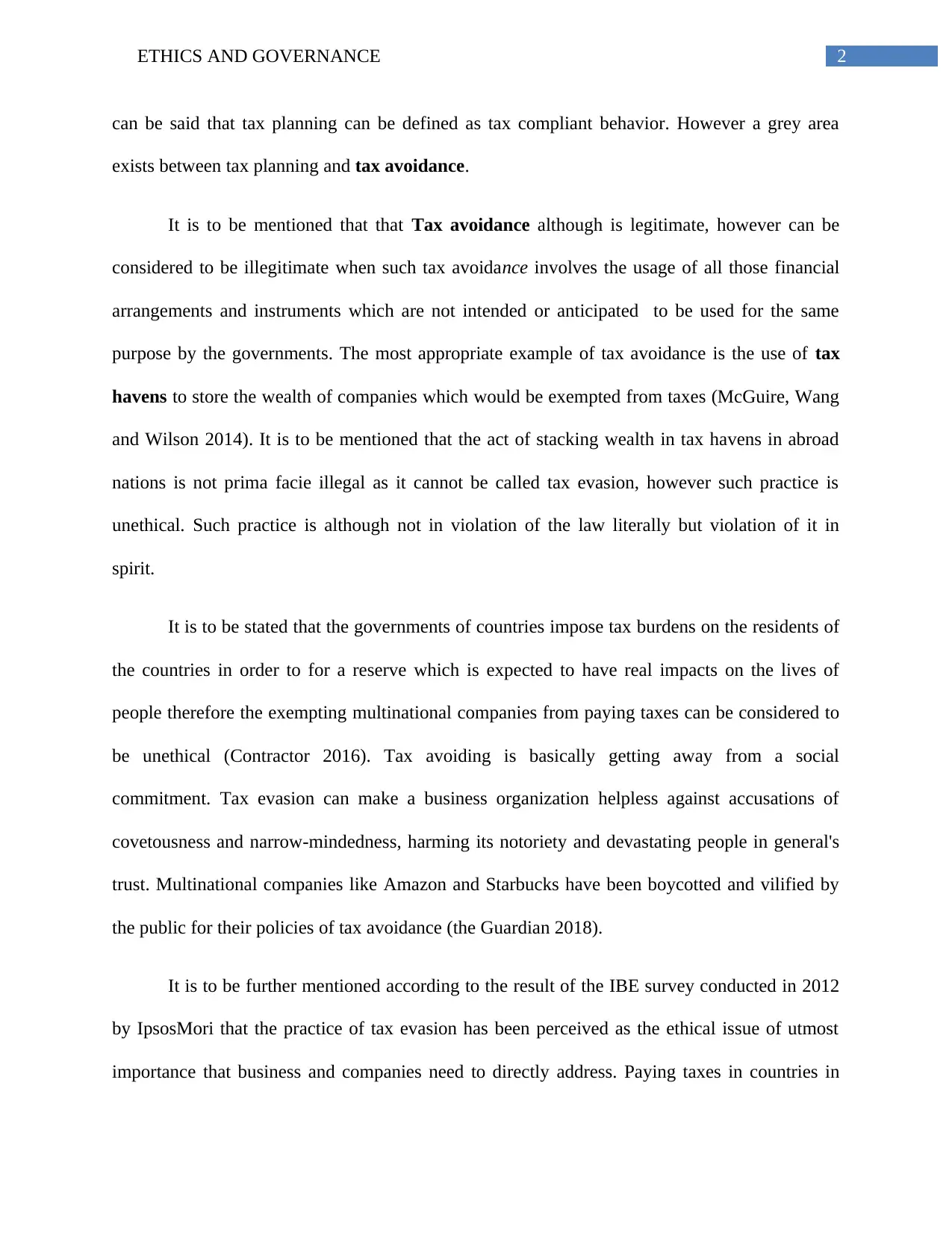
2ETHICS AND GOVERNANCE
can be said that tax planning can be defined as tax compliant behavior. However a grey area
exists between tax planning and tax avoidance.
It is to be mentioned that that Tax avoidance although is legitimate, however can be
considered to be illegitimate when such tax avoidance involves the usage of all those financial
arrangements and instruments which are not intended or anticipated to be used for the same
purpose by the governments. The most appropriate example of tax avoidance is the use of tax
havens to store the wealth of companies which would be exempted from taxes (McGuire, Wang
and Wilson 2014). It is to be mentioned that the act of stacking wealth in tax havens in abroad
nations is not prima facie illegal as it cannot be called tax evasion, however such practice is
unethical. Such practice is although not in violation of the law literally but violation of it in
spirit.
It is to be stated that the governments of countries impose tax burdens on the residents of
the countries in order to for a reserve which is expected to have real impacts on the lives of
people therefore the exempting multinational companies from paying taxes can be considered to
be unethical (Contractor 2016). Tax avoiding is basically getting away from a social
commitment. Tax evasion can make a business organization helpless against accusations of
covetousness and narrow-mindedness, harming its notoriety and devastating people in general's
trust. Multinational companies like Amazon and Starbucks have been boycotted and vilified by
the public for their policies of tax avoidance (the Guardian 2018).
It is to be further mentioned according to the result of the IBE survey conducted in 2012
by IpsosMori that the practice of tax evasion has been perceived as the ethical issue of utmost
importance that business and companies need to directly address. Paying taxes in countries in
can be said that tax planning can be defined as tax compliant behavior. However a grey area
exists between tax planning and tax avoidance.
It is to be mentioned that that Tax avoidance although is legitimate, however can be
considered to be illegitimate when such tax avoidance involves the usage of all those financial
arrangements and instruments which are not intended or anticipated to be used for the same
purpose by the governments. The most appropriate example of tax avoidance is the use of tax
havens to store the wealth of companies which would be exempted from taxes (McGuire, Wang
and Wilson 2014). It is to be mentioned that the act of stacking wealth in tax havens in abroad
nations is not prima facie illegal as it cannot be called tax evasion, however such practice is
unethical. Such practice is although not in violation of the law literally but violation of it in
spirit.
It is to be stated that the governments of countries impose tax burdens on the residents of
the countries in order to for a reserve which is expected to have real impacts on the lives of
people therefore the exempting multinational companies from paying taxes can be considered to
be unethical (Contractor 2016). Tax avoiding is basically getting away from a social
commitment. Tax evasion can make a business organization helpless against accusations of
covetousness and narrow-mindedness, harming its notoriety and devastating people in general's
trust. Multinational companies like Amazon and Starbucks have been boycotted and vilified by
the public for their policies of tax avoidance (the Guardian 2018).
It is to be further mentioned according to the result of the IBE survey conducted in 2012
by IpsosMori that the practice of tax evasion has been perceived as the ethical issue of utmost
importance that business and companies need to directly address. Paying taxes in countries in
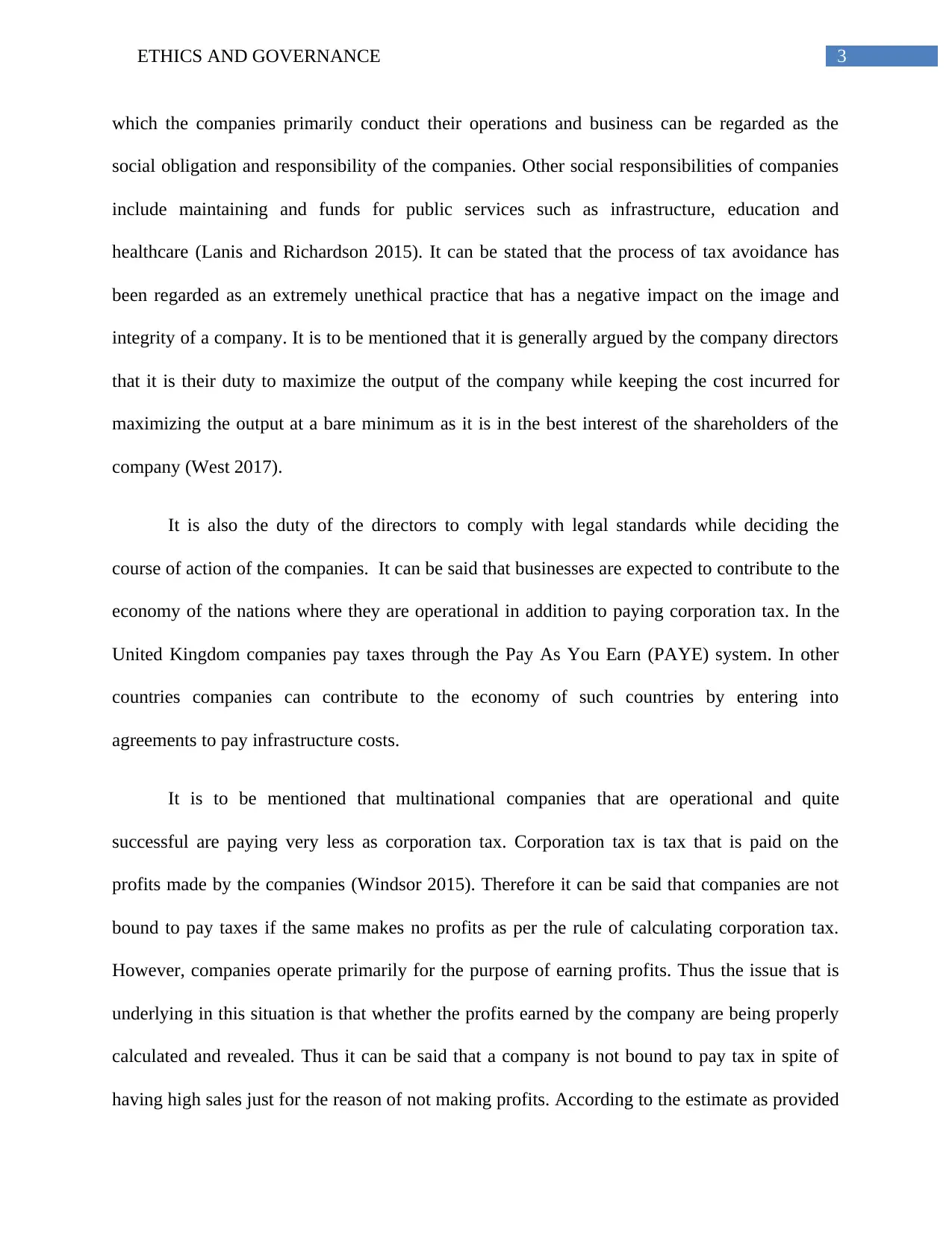
3ETHICS AND GOVERNANCE
which the companies primarily conduct their operations and business can be regarded as the
social obligation and responsibility of the companies. Other social responsibilities of companies
include maintaining and funds for public services such as infrastructure, education and
healthcare (Lanis and Richardson 2015). It can be stated that the process of tax avoidance has
been regarded as an extremely unethical practice that has a negative impact on the image and
integrity of a company. It is to be mentioned that it is generally argued by the company directors
that it is their duty to maximize the output of the company while keeping the cost incurred for
maximizing the output at a bare minimum as it is in the best interest of the shareholders of the
company (West 2017).
It is also the duty of the directors to comply with legal standards while deciding the
course of action of the companies. It can be said that businesses are expected to contribute to the
economy of the nations where they are operational in addition to paying corporation tax. In the
United Kingdom companies pay taxes through the Pay As You Earn (PAYE) system. In other
countries companies can contribute to the economy of such countries by entering into
agreements to pay infrastructure costs.
It is to be mentioned that multinational companies that are operational and quite
successful are paying very less as corporation tax. Corporation tax is tax that is paid on the
profits made by the companies (Windsor 2015). Therefore it can be said that companies are not
bound to pay taxes if the same makes no profits as per the rule of calculating corporation tax.
However, companies operate primarily for the purpose of earning profits. Thus the issue that is
underlying in this situation is that whether the profits earned by the company are being properly
calculated and revealed. Thus it can be said that a company is not bound to pay tax in spite of
having high sales just for the reason of not making profits. According to the estimate as provided
which the companies primarily conduct their operations and business can be regarded as the
social obligation and responsibility of the companies. Other social responsibilities of companies
include maintaining and funds for public services such as infrastructure, education and
healthcare (Lanis and Richardson 2015). It can be stated that the process of tax avoidance has
been regarded as an extremely unethical practice that has a negative impact on the image and
integrity of a company. It is to be mentioned that it is generally argued by the company directors
that it is their duty to maximize the output of the company while keeping the cost incurred for
maximizing the output at a bare minimum as it is in the best interest of the shareholders of the
company (West 2017).
It is also the duty of the directors to comply with legal standards while deciding the
course of action of the companies. It can be said that businesses are expected to contribute to the
economy of the nations where they are operational in addition to paying corporation tax. In the
United Kingdom companies pay taxes through the Pay As You Earn (PAYE) system. In other
countries companies can contribute to the economy of such countries by entering into
agreements to pay infrastructure costs.
It is to be mentioned that multinational companies that are operational and quite
successful are paying very less as corporation tax. Corporation tax is tax that is paid on the
profits made by the companies (Windsor 2015). Therefore it can be said that companies are not
bound to pay taxes if the same makes no profits as per the rule of calculating corporation tax.
However, companies operate primarily for the purpose of earning profits. Thus the issue that is
underlying in this situation is that whether the profits earned by the company are being properly
calculated and revealed. Thus it can be said that a company is not bound to pay tax in spite of
having high sales just for the reason of not making profits. According to the estimate as provided
Secure Best Marks with AI Grader
Need help grading? Try our AI Grader for instant feedback on your assignments.
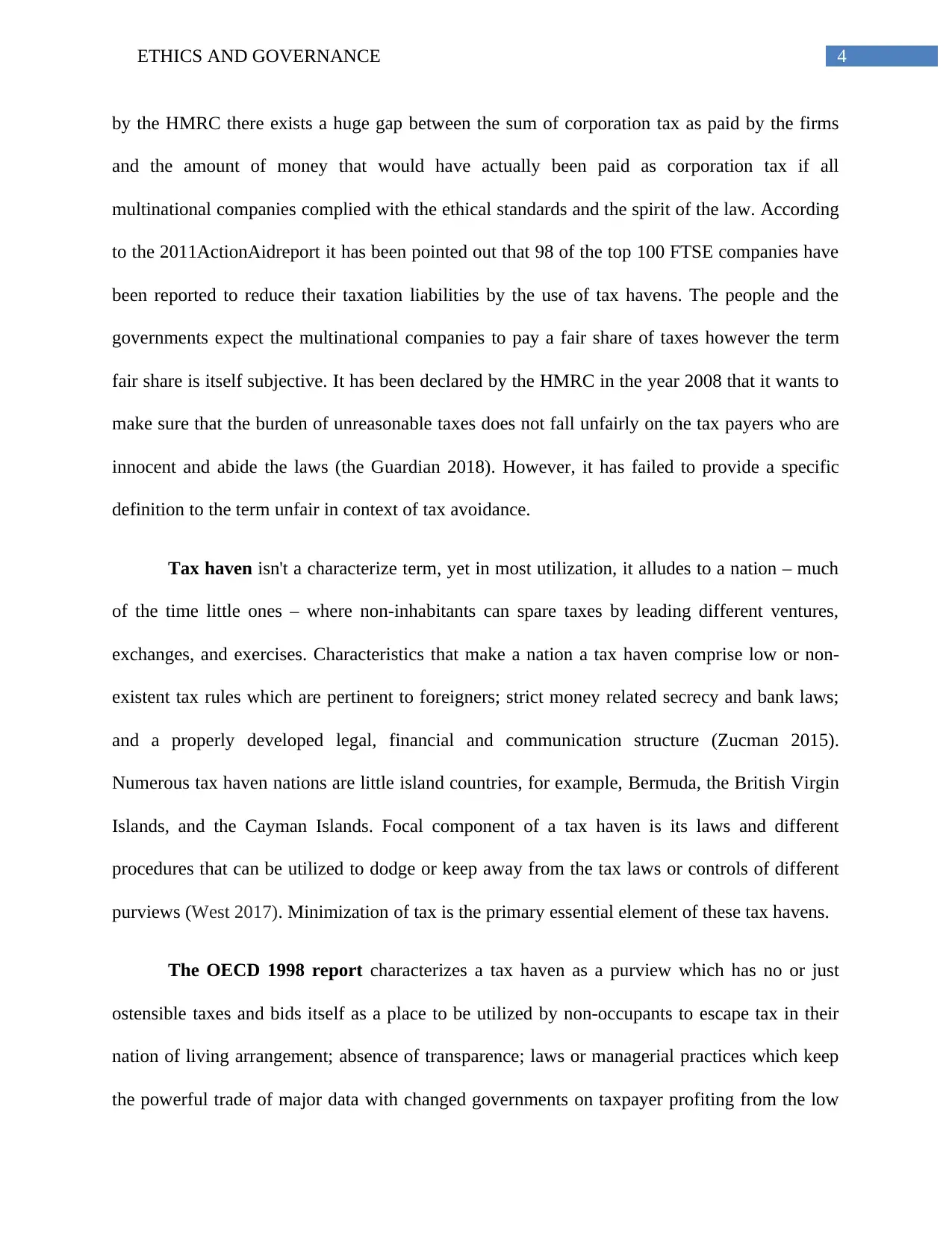
4ETHICS AND GOVERNANCE
by the HMRC there exists a huge gap between the sum of corporation tax as paid by the firms
and the amount of money that would have actually been paid as corporation tax if all
multinational companies complied with the ethical standards and the spirit of the law. According
to the 2011ActionAidreport it has been pointed out that 98 of the top 100 FTSE companies have
been reported to reduce their taxation liabilities by the use of tax havens. The people and the
governments expect the multinational companies to pay a fair share of taxes however the term
fair share is itself subjective. It has been declared by the HMRC in the year 2008 that it wants to
make sure that the burden of unreasonable taxes does not fall unfairly on the tax payers who are
innocent and abide the laws (the Guardian 2018). However, it has failed to provide a specific
definition to the term unfair in context of tax avoidance.
Tax haven isn't a characterize term, yet in most utilization, it alludes to a nation – much
of the time little ones – where non-inhabitants can spare taxes by leading different ventures,
exchanges, and exercises. Characteristics that make a nation a tax haven comprise low or non-
existent tax rules which are pertinent to foreigners; strict money related secrecy and bank laws;
and a properly developed legal, financial and communication structure (Zucman 2015).
Numerous tax haven nations are little island countries, for example, Bermuda, the British Virgin
Islands, and the Cayman Islands. Focal component of a tax haven is its laws and different
procedures that can be utilized to dodge or keep away from the tax laws or controls of different
purviews (West 2017). Minimization of tax is the primary essential element of these tax havens.
The OECD 1998 report characterizes a tax haven as a purview which has no or just
ostensible taxes and bids itself as a place to be utilized by non-occupants to escape tax in their
nation of living arrangement; absence of transparence; laws or managerial practices which keep
the powerful trade of major data with changed governments on taxpayer profiting from the low
by the HMRC there exists a huge gap between the sum of corporation tax as paid by the firms
and the amount of money that would have actually been paid as corporation tax if all
multinational companies complied with the ethical standards and the spirit of the law. According
to the 2011ActionAidreport it has been pointed out that 98 of the top 100 FTSE companies have
been reported to reduce their taxation liabilities by the use of tax havens. The people and the
governments expect the multinational companies to pay a fair share of taxes however the term
fair share is itself subjective. It has been declared by the HMRC in the year 2008 that it wants to
make sure that the burden of unreasonable taxes does not fall unfairly on the tax payers who are
innocent and abide the laws (the Guardian 2018). However, it has failed to provide a specific
definition to the term unfair in context of tax avoidance.
Tax haven isn't a characterize term, yet in most utilization, it alludes to a nation – much
of the time little ones – where non-inhabitants can spare taxes by leading different ventures,
exchanges, and exercises. Characteristics that make a nation a tax haven comprise low or non-
existent tax rules which are pertinent to foreigners; strict money related secrecy and bank laws;
and a properly developed legal, financial and communication structure (Zucman 2015).
Numerous tax haven nations are little island countries, for example, Bermuda, the British Virgin
Islands, and the Cayman Islands. Focal component of a tax haven is its laws and different
procedures that can be utilized to dodge or keep away from the tax laws or controls of different
purviews (West 2017). Minimization of tax is the primary essential element of these tax havens.
The OECD 1998 report characterizes a tax haven as a purview which has no or just
ostensible taxes and bids itself as a place to be utilized by non-occupants to escape tax in their
nation of living arrangement; absence of transparence; laws or managerial practices which keep
the powerful trade of major data with changed governments on taxpayer profiting from the low
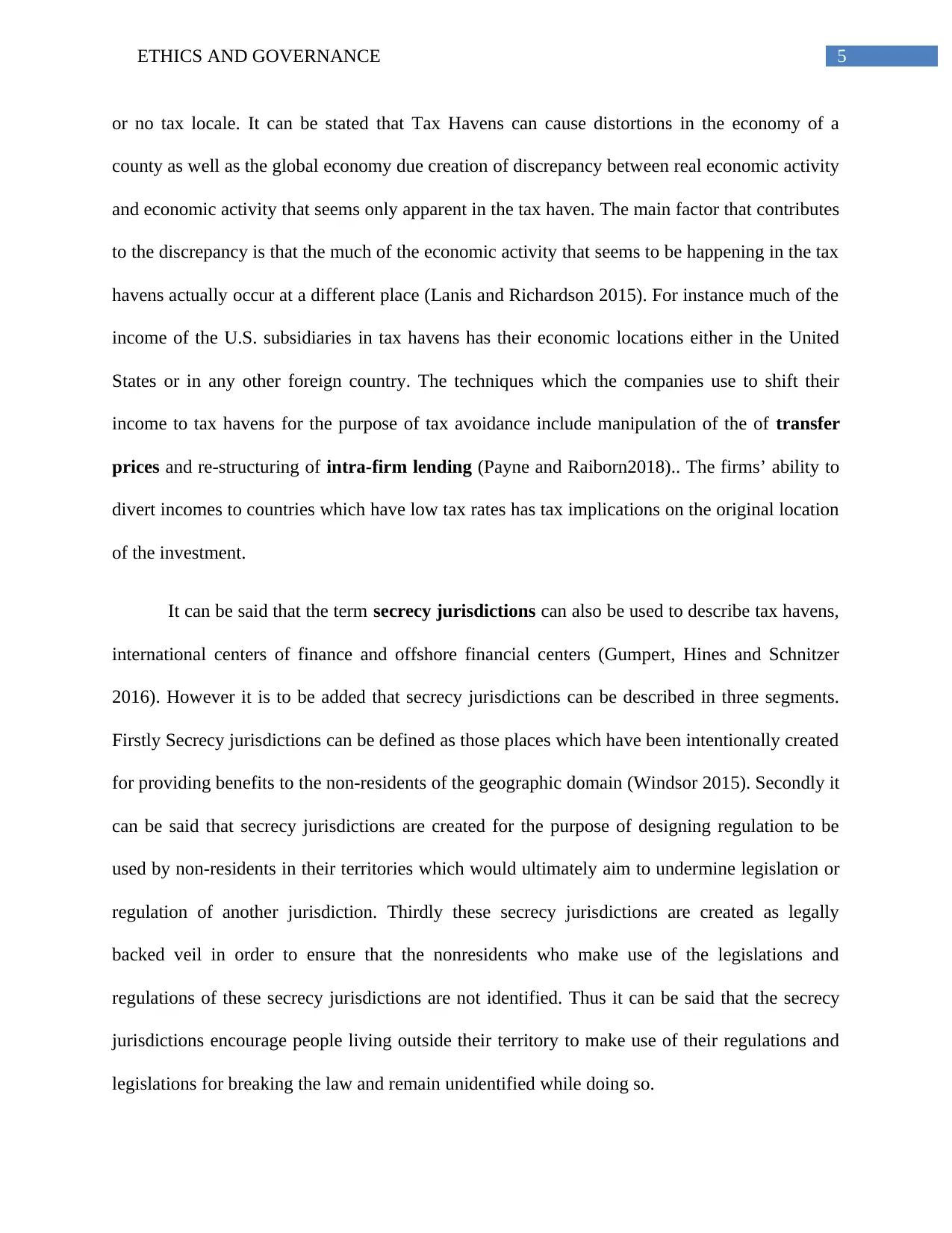
5ETHICS AND GOVERNANCE
or no tax locale. It can be stated that Tax Havens can cause distortions in the economy of a
county as well as the global economy due creation of discrepancy between real economic activity
and economic activity that seems only apparent in the tax haven. The main factor that contributes
to the discrepancy is that the much of the economic activity that seems to be happening in the tax
havens actually occur at a different place (Lanis and Richardson 2015). For instance much of the
income of the U.S. subsidiaries in tax havens has their economic locations either in the United
States or in any other foreign country. The techniques which the companies use to shift their
income to tax havens for the purpose of tax avoidance include manipulation of the of transfer
prices and re-structuring of intra-firm lending (Payne and Raiborn2018).. The firms’ ability to
divert incomes to countries which have low tax rates has tax implications on the original location
of the investment.
It can be said that the term secrecy jurisdictions can also be used to describe tax havens,
international centers of finance and offshore financial centers (Gumpert, Hines and Schnitzer
2016). However it is to be added that secrecy jurisdictions can be described in three segments.
Firstly Secrecy jurisdictions can be defined as those places which have been intentionally created
for providing benefits to the non-residents of the geographic domain (Windsor 2015). Secondly it
can be said that secrecy jurisdictions are created for the purpose of designing regulation to be
used by non-residents in their territories which would ultimately aim to undermine legislation or
regulation of another jurisdiction. Thirdly these secrecy jurisdictions are created as legally
backed veil in order to ensure that the nonresidents who make use of the legislations and
regulations of these secrecy jurisdictions are not identified. Thus it can be said that the secrecy
jurisdictions encourage people living outside their territory to make use of their regulations and
legislations for breaking the law and remain unidentified while doing so.
or no tax locale. It can be stated that Tax Havens can cause distortions in the economy of a
county as well as the global economy due creation of discrepancy between real economic activity
and economic activity that seems only apparent in the tax haven. The main factor that contributes
to the discrepancy is that the much of the economic activity that seems to be happening in the tax
havens actually occur at a different place (Lanis and Richardson 2015). For instance much of the
income of the U.S. subsidiaries in tax havens has their economic locations either in the United
States or in any other foreign country. The techniques which the companies use to shift their
income to tax havens for the purpose of tax avoidance include manipulation of the of transfer
prices and re-structuring of intra-firm lending (Payne and Raiborn2018).. The firms’ ability to
divert incomes to countries which have low tax rates has tax implications on the original location
of the investment.
It can be said that the term secrecy jurisdictions can also be used to describe tax havens,
international centers of finance and offshore financial centers (Gumpert, Hines and Schnitzer
2016). However it is to be added that secrecy jurisdictions can be described in three segments.
Firstly Secrecy jurisdictions can be defined as those places which have been intentionally created
for providing benefits to the non-residents of the geographic domain (Windsor 2015). Secondly it
can be said that secrecy jurisdictions are created for the purpose of designing regulation to be
used by non-residents in their territories which would ultimately aim to undermine legislation or
regulation of another jurisdiction. Thirdly these secrecy jurisdictions are created as legally
backed veil in order to ensure that the nonresidents who make use of the legislations and
regulations of these secrecy jurisdictions are not identified. Thus it can be said that the secrecy
jurisdictions encourage people living outside their territory to make use of their regulations and
legislations for breaking the law and remain unidentified while doing so.
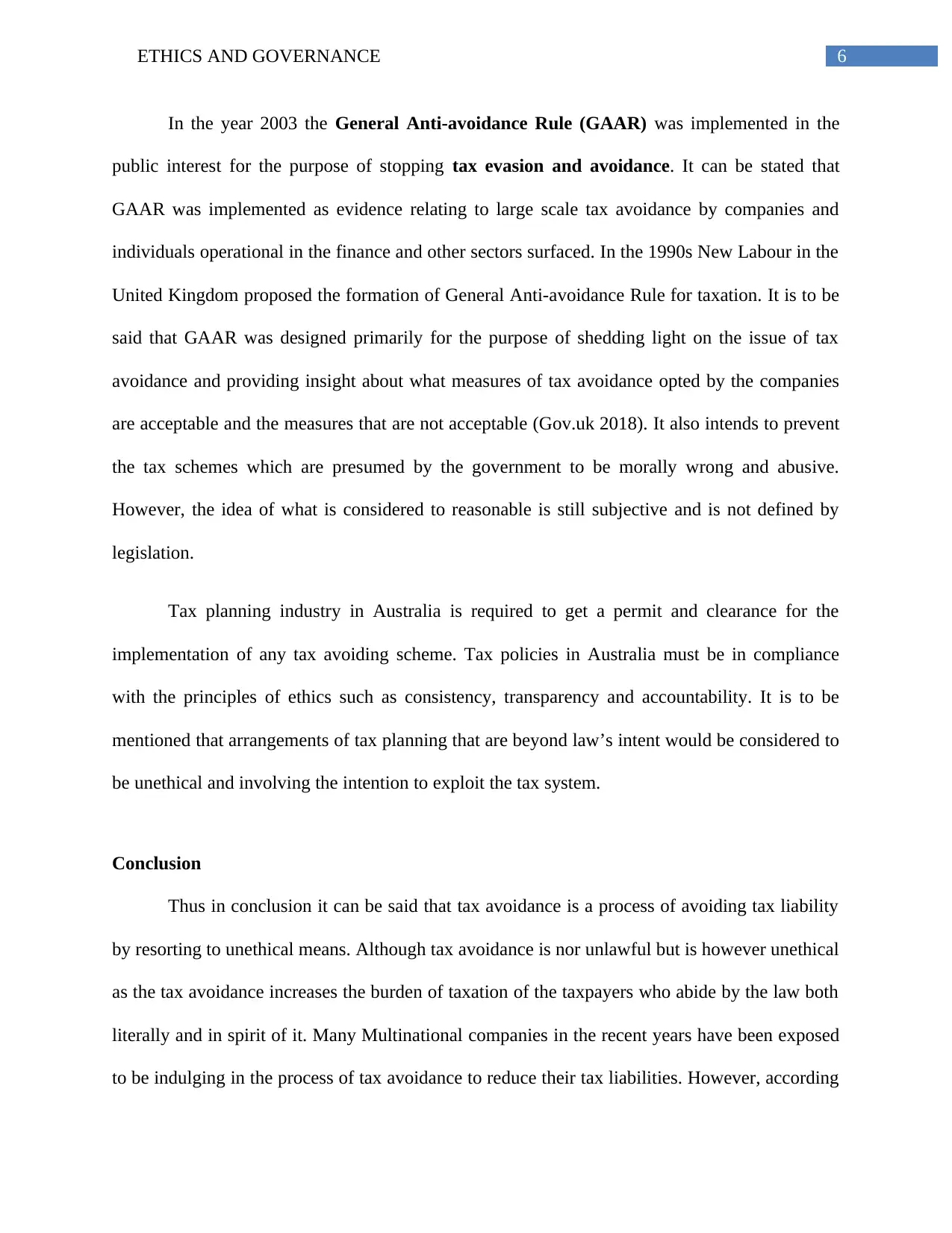
6ETHICS AND GOVERNANCE
In the year 2003 the General Anti-avoidance Rule (GAAR) was implemented in the
public interest for the purpose of stopping tax evasion and avoidance. It can be stated that
GAAR was implemented as evidence relating to large scale tax avoidance by companies and
individuals operational in the finance and other sectors surfaced. In the 1990s New Labour in the
United Kingdom proposed the formation of General Anti-avoidance Rule for taxation. It is to be
said that GAAR was designed primarily for the purpose of shedding light on the issue of tax
avoidance and providing insight about what measures of tax avoidance opted by the companies
are acceptable and the measures that are not acceptable (Gov.uk 2018). It also intends to prevent
the tax schemes which are presumed by the government to be morally wrong and abusive.
However, the idea of what is considered to reasonable is still subjective and is not defined by
legislation.
Tax planning industry in Australia is required to get a permit and clearance for the
implementation of any tax avoiding scheme. Tax policies in Australia must be in compliance
with the principles of ethics such as consistency, transparency and accountability. It is to be
mentioned that arrangements of tax planning that are beyond law’s intent would be considered to
be unethical and involving the intention to exploit the tax system.
Conclusion
Thus in conclusion it can be said that tax avoidance is a process of avoiding tax liability
by resorting to unethical means. Although tax avoidance is nor unlawful but is however unethical
as the tax avoidance increases the burden of taxation of the taxpayers who abide by the law both
literally and in spirit of it. Many Multinational companies in the recent years have been exposed
to be indulging in the process of tax avoidance to reduce their tax liabilities. However, according
In the year 2003 the General Anti-avoidance Rule (GAAR) was implemented in the
public interest for the purpose of stopping tax evasion and avoidance. It can be stated that
GAAR was implemented as evidence relating to large scale tax avoidance by companies and
individuals operational in the finance and other sectors surfaced. In the 1990s New Labour in the
United Kingdom proposed the formation of General Anti-avoidance Rule for taxation. It is to be
said that GAAR was designed primarily for the purpose of shedding light on the issue of tax
avoidance and providing insight about what measures of tax avoidance opted by the companies
are acceptable and the measures that are not acceptable (Gov.uk 2018). It also intends to prevent
the tax schemes which are presumed by the government to be morally wrong and abusive.
However, the idea of what is considered to reasonable is still subjective and is not defined by
legislation.
Tax planning industry in Australia is required to get a permit and clearance for the
implementation of any tax avoiding scheme. Tax policies in Australia must be in compliance
with the principles of ethics such as consistency, transparency and accountability. It is to be
mentioned that arrangements of tax planning that are beyond law’s intent would be considered to
be unethical and involving the intention to exploit the tax system.
Conclusion
Thus in conclusion it can be said that tax avoidance is a process of avoiding tax liability
by resorting to unethical means. Although tax avoidance is nor unlawful but is however unethical
as the tax avoidance increases the burden of taxation of the taxpayers who abide by the law both
literally and in spirit of it. Many Multinational companies in the recent years have been exposed
to be indulging in the process of tax avoidance to reduce their tax liabilities. However, according
Paraphrase This Document
Need a fresh take? Get an instant paraphrase of this document with our AI Paraphraser
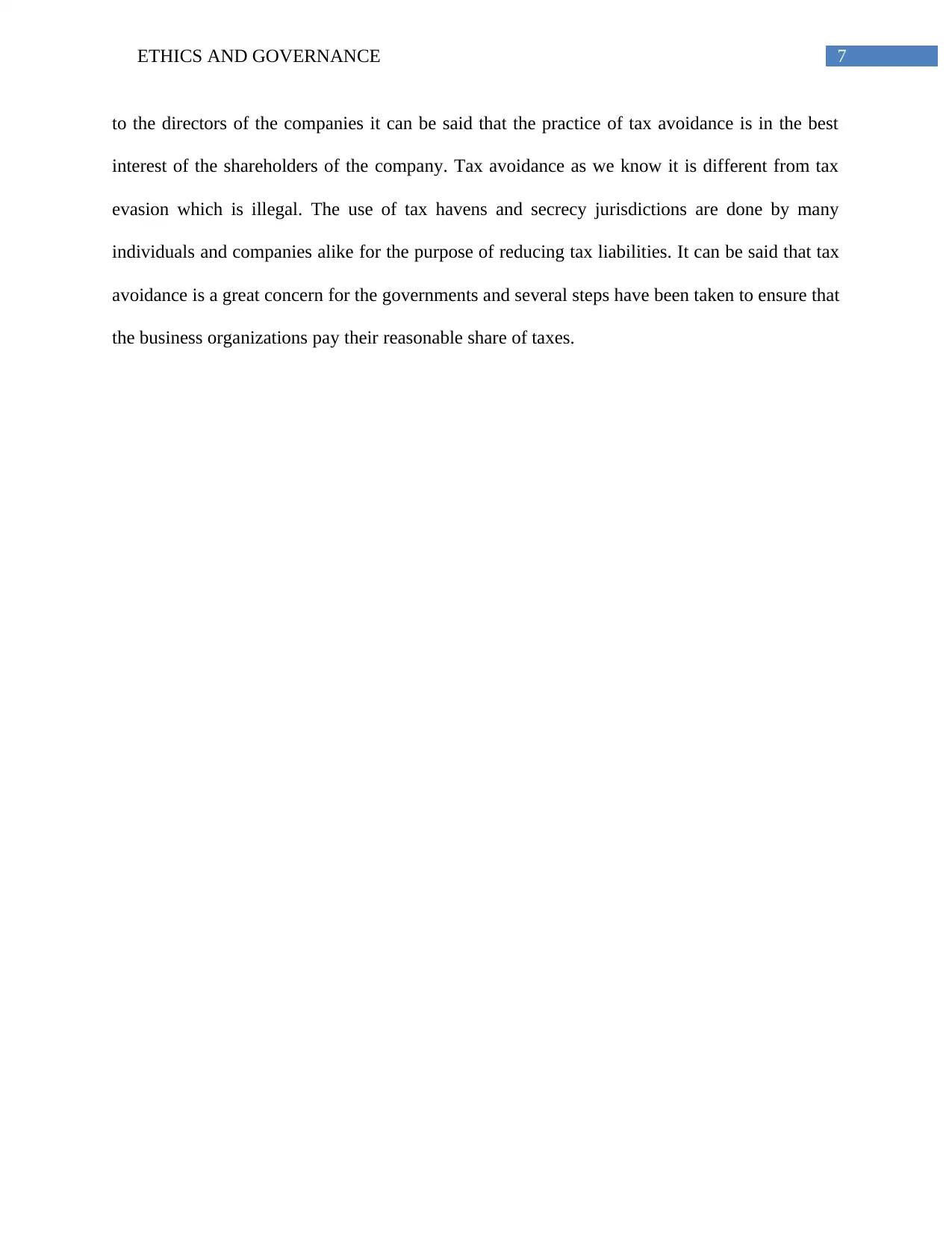
7ETHICS AND GOVERNANCE
to the directors of the companies it can be said that the practice of tax avoidance is in the best
interest of the shareholders of the company. Tax avoidance as we know it is different from tax
evasion which is illegal. The use of tax havens and secrecy jurisdictions are done by many
individuals and companies alike for the purpose of reducing tax liabilities. It can be said that tax
avoidance is a great concern for the governments and several steps have been taken to ensure that
the business organizations pay their reasonable share of taxes.
to the directors of the companies it can be said that the practice of tax avoidance is in the best
interest of the shareholders of the company. Tax avoidance as we know it is different from tax
evasion which is illegal. The use of tax havens and secrecy jurisdictions are done by many
individuals and companies alike for the purpose of reducing tax liabilities. It can be said that tax
avoidance is a great concern for the governments and several steps have been taken to ensure that
the business organizations pay their reasonable share of taxes.
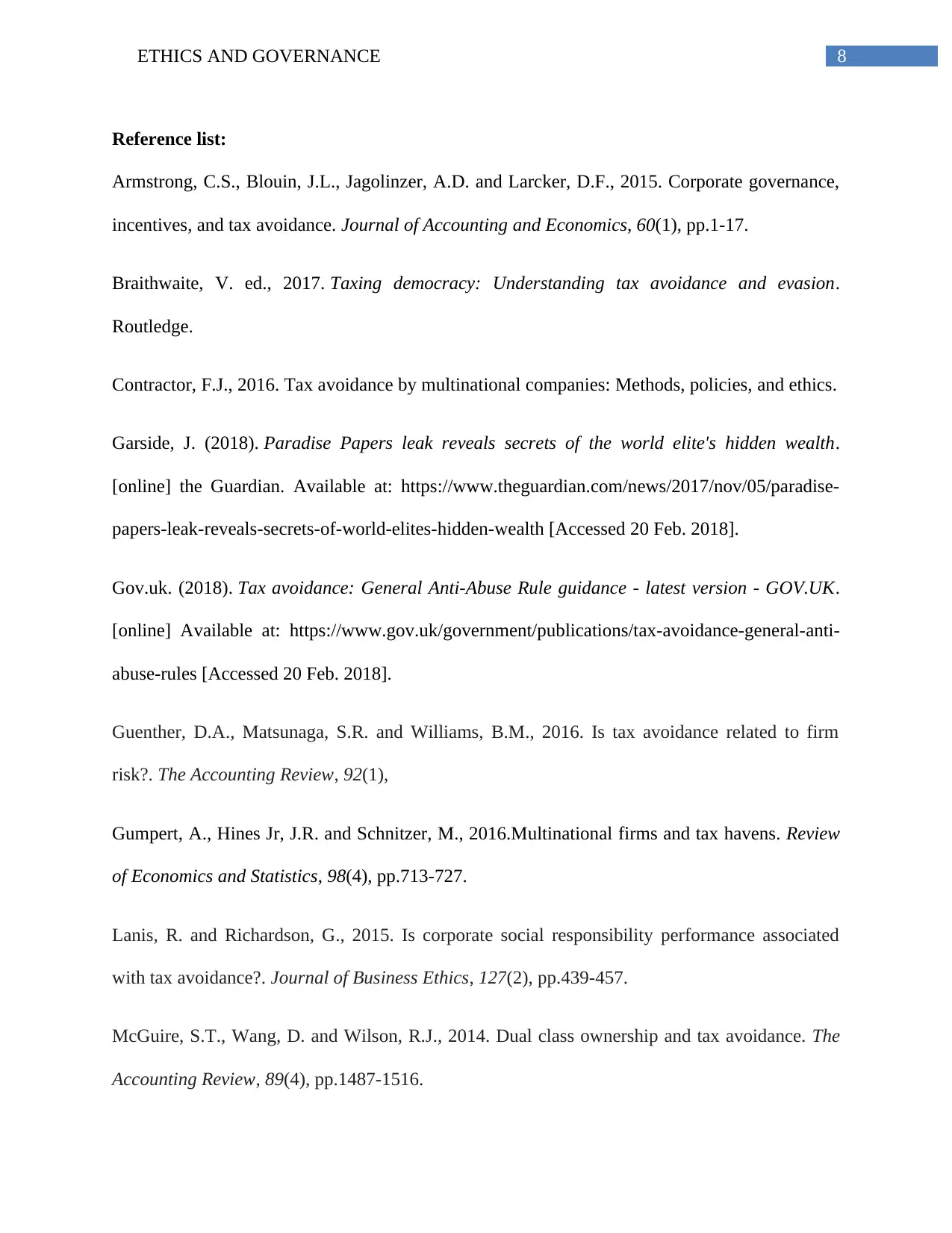
8ETHICS AND GOVERNANCE
Reference list:
Armstrong, C.S., Blouin, J.L., Jagolinzer, A.D. and Larcker, D.F., 2015. Corporate governance,
incentives, and tax avoidance. Journal of Accounting and Economics, 60(1), pp.1-17.
Braithwaite, V. ed., 2017. Taxing democracy: Understanding tax avoidance and evasion.
Routledge.
Contractor, F.J., 2016. Tax avoidance by multinational companies: Methods, policies, and ethics.
Garside, J. (2018). Paradise Papers leak reveals secrets of the world elite's hidden wealth.
[online] the Guardian. Available at: https://www.theguardian.com/news/2017/nov/05/paradise-
papers-leak-reveals-secrets-of-world-elites-hidden-wealth [Accessed 20 Feb. 2018].
Gov.uk. (2018). Tax avoidance: General Anti-Abuse Rule guidance - latest version - GOV.UK.
[online] Available at: https://www.gov.uk/government/publications/tax-avoidance-general-anti-
abuse-rules [Accessed 20 Feb. 2018].
Guenther, D.A., Matsunaga, S.R. and Williams, B.M., 2016. Is tax avoidance related to firm
risk?. The Accounting Review, 92(1),
Gumpert, A., Hines Jr, J.R. and Schnitzer, M., 2016.Multinational firms and tax havens. Review
of Economics and Statistics, 98(4), pp.713-727.
Lanis, R. and Richardson, G., 2015. Is corporate social responsibility performance associated
with tax avoidance?. Journal of Business Ethics, 127(2), pp.439-457.
McGuire, S.T., Wang, D. and Wilson, R.J., 2014. Dual class ownership and tax avoidance. The
Accounting Review, 89(4), pp.1487-1516.
Reference list:
Armstrong, C.S., Blouin, J.L., Jagolinzer, A.D. and Larcker, D.F., 2015. Corporate governance,
incentives, and tax avoidance. Journal of Accounting and Economics, 60(1), pp.1-17.
Braithwaite, V. ed., 2017. Taxing democracy: Understanding tax avoidance and evasion.
Routledge.
Contractor, F.J., 2016. Tax avoidance by multinational companies: Methods, policies, and ethics.
Garside, J. (2018). Paradise Papers leak reveals secrets of the world elite's hidden wealth.
[online] the Guardian. Available at: https://www.theguardian.com/news/2017/nov/05/paradise-
papers-leak-reveals-secrets-of-world-elites-hidden-wealth [Accessed 20 Feb. 2018].
Gov.uk. (2018). Tax avoidance: General Anti-Abuse Rule guidance - latest version - GOV.UK.
[online] Available at: https://www.gov.uk/government/publications/tax-avoidance-general-anti-
abuse-rules [Accessed 20 Feb. 2018].
Guenther, D.A., Matsunaga, S.R. and Williams, B.M., 2016. Is tax avoidance related to firm
risk?. The Accounting Review, 92(1),
Gumpert, A., Hines Jr, J.R. and Schnitzer, M., 2016.Multinational firms and tax havens. Review
of Economics and Statistics, 98(4), pp.713-727.
Lanis, R. and Richardson, G., 2015. Is corporate social responsibility performance associated
with tax avoidance?. Journal of Business Ethics, 127(2), pp.439-457.
McGuire, S.T., Wang, D. and Wilson, R.J., 2014. Dual class ownership and tax avoidance. The
Accounting Review, 89(4), pp.1487-1516.
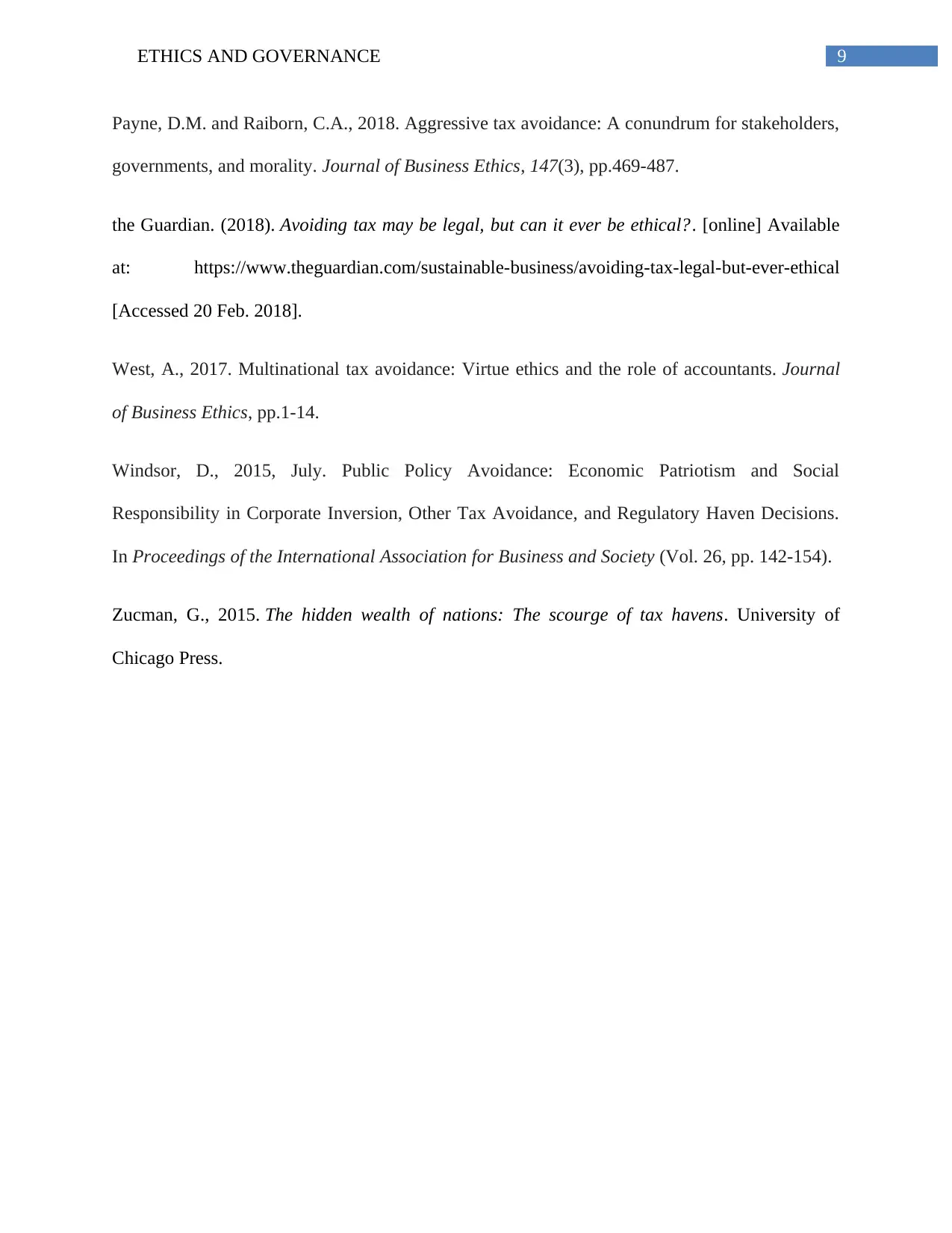
9ETHICS AND GOVERNANCE
Payne, D.M. and Raiborn, C.A., 2018. Aggressive tax avoidance: A conundrum for stakeholders,
governments, and morality. Journal of Business Ethics, 147(3), pp.469-487.
the Guardian. (2018). Avoiding tax may be legal, but can it ever be ethical?. [online] Available
at: https://www.theguardian.com/sustainable-business/avoiding-tax-legal-but-ever-ethical
[Accessed 20 Feb. 2018].
West, A., 2017. Multinational tax avoidance: Virtue ethics and the role of accountants. Journal
of Business Ethics, pp.1-14.
Windsor, D., 2015, July. Public Policy Avoidance: Economic Patriotism and Social
Responsibility in Corporate Inversion, Other Tax Avoidance, and Regulatory Haven Decisions.
In Proceedings of the International Association for Business and Society (Vol. 26, pp. 142-154).
Zucman, G., 2015. The hidden wealth of nations: The scourge of tax havens. University of
Chicago Press.
Payne, D.M. and Raiborn, C.A., 2018. Aggressive tax avoidance: A conundrum for stakeholders,
governments, and morality. Journal of Business Ethics, 147(3), pp.469-487.
the Guardian. (2018). Avoiding tax may be legal, but can it ever be ethical?. [online] Available
at: https://www.theguardian.com/sustainable-business/avoiding-tax-legal-but-ever-ethical
[Accessed 20 Feb. 2018].
West, A., 2017. Multinational tax avoidance: Virtue ethics and the role of accountants. Journal
of Business Ethics, pp.1-14.
Windsor, D., 2015, July. Public Policy Avoidance: Economic Patriotism and Social
Responsibility in Corporate Inversion, Other Tax Avoidance, and Regulatory Haven Decisions.
In Proceedings of the International Association for Business and Society (Vol. 26, pp. 142-154).
Zucman, G., 2015. The hidden wealth of nations: The scourge of tax havens. University of
Chicago Press.
1 out of 10
Your All-in-One AI-Powered Toolkit for Academic Success.
+13062052269
info@desklib.com
Available 24*7 on WhatsApp / Email
![[object Object]](/_next/static/media/star-bottom.7253800d.svg)
Unlock your academic potential
© 2024 | Zucol Services PVT LTD | All rights reserved.